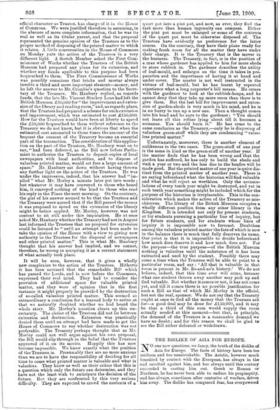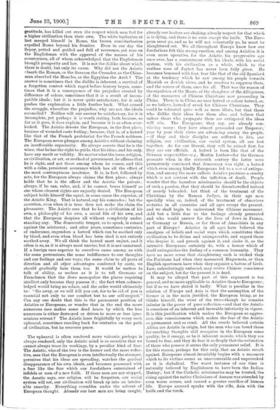THE DISLIKE OF ASIA FOR EUROPE. N O one now questions,
we fancy, the truth of the dislike of Asia for Europe. The facts of history have been too uniform and too unmistakable. The Asiatic, however much benefited by contact with the European, has always in the end revolted against him, and has always until this century succeeded in casting him out. Greek or Roman or Northern, he has never been able to endure his propinquity, and has always, sometimes after centuries of warfare, driven him away. The dislike has conquered fear, has overpowered
gratitude, has killed out even the respect which men feel for a higher civilisation than their own. The white barbarian at last merged himself in Rome, the brown semi-barbarian expelled Rome beyond his frontier. Even in our day the Sepoy, petted and guided and full of reverence, yet rose on the Englishman with the approval of the masses of his countrymen, all of whom acknowledged that the Englishman brought prosperity and law. It is not the dislike about which there is doubt, but only its cause. Why did not the Asiatic ebsorb the Roman, or the Saracen the Crusader, as the China- man absorbed the Manchu, or the Egyptian the Arab ? The answer is sometimes that the dislike is inherent, a survival of a forgotten contest which raged before history began, some- times that it is a consequence of the prejudice created by difference of colour, sometimes that it is a result of incom- patible ideals ; but it is never quite satisfactory, for it only pushes the explanation a little further back. What caused the struggle, wherefore the prejudice, why are not the ideals reconciled ? Neither will our answer be satisfactory, for it is incomplete, yet perhaps it is worth stating, both because, so far as it goes, it does explain, and because it is so often over- looked. The Asiatic detests the European, in the first place, because of wounded caste feeling; because, that is, of a hatred like that of the French proletariat for the French noblesse. The European never plunges among Asiatics without claiming an insufferable superiority. He always asserts that he is the wiser, that he has the right to guide, that his ideas, and his only, have any merit or validity. No matter what the issue, religion, or civilisation, or art, or method of government, he affirms that he is right, and not those among whom he comes, and this with a calm, persistent assurance which has all the effect of the most contemptuous insolerice. It is, in fact, followed by acts, for the European always claims the first place; always holds that he is the officer and the Asiatic the private ; always, if he can, rules, and, if he cannot, bears himself as one whose clearest rights are unjustly denied. The European subject holds himself the equal, in some sense the superior, of the Asiatic King. That is natural, say his comrades ; but the assertion, even when it is true, does not make the claim the pleasanter. The Asiatic sees that he has a civilisation of his own, a philosophy of his own, a social life of his own, and that the European despises all without completely under- standing any. The democratic temper, so to speak, is roused against the aristocrat; and after years, sometimes centuries, of endurance, engenders a hatred which can be soothed only by blood, and even when blood has been shed is not entirely soothed away. We all think the hatred most unjust, and it often is so, as it is always most unwise, but it is not unnatural. If a foreign race superior to ourselves came among us with the same pretensions, the same indifference to our thoughts and our feelings and our ways, the same claim to all posts of direction and all other advantages conferred by caste, we should gradually hate them too. It would be useless to talk of ability, as useless as it is to tell Germans or Frenchmen that the Jews monopolise the places requiring intellect only because they possess it ; the fact when acknow- ledged would bring no solace, and the order would ultimately be : " Go away, or we will kill you out, for to be rid of you is essential not only to our comfort but to our self-respect." Can any one doubt that this is the permanent position of Asiatics or Europeans, or wonder that in the end the more numerous race makes some dead heave by which the less numerous is either destroyed or driven to more or less igno- minious retreat ? The Asiatic loses frightfully by every such upheaval, sometimes receding back for centuries on the path of civilisation, but he recovers peace.
The upheaval is often rendered more volcanic, perhaps is always rendered, only the Asiatic mind is so secretive that we cannot always trace its workings, by a peculiar kind of fear. The Asiatic, who of the two is the keener and the more reflec- tive, sees that the European is even intellectually the stronger, perceives that his ideas are spreading, watches the gradual disappearance of his own ideals, and becomes possessed with a fear like the fear which our forefathers entertained of infidels or men of a new faith. If these men are not stopped, the Asiatic says, our religion will be forgotten, our social system will rot, our civilisation will break up into an intoler- able anarchy. Everything crumbles under the solvent of European thought. Already our best men are being caught,
already our leaders are shaking, already respect for that which is is dying, and there is no cure except the knife. The Euro- pean must go, and as he will not voluntarily go, he must be slaughtered out. We all throughout Europe know how our forefathers felt this strong emotion, and among Asiatics it is even more operative, for the Asiatic, his progressive age once over, has a contentment with his ideals, with his social system, with his civilisation as a whole, which to the restless sons of Japhet has never been fully given. He becomes bemused with fear, fear like that of the old Spaniard at the tendency which he saw among his people towards Moorish or Jewish views, and he resolves to suppress them, and the source of them, once for all. That was the reason of the expulsion of the Moors, of the slaughter of the Albigenses, of the massacres of Chinese Christians now proceeding in China. There is in China no race hatred or colour hatred, or, as we believe, hatred of creed for Chinese Christians. They could be tolerated quite well as mere idiots, but that those who dislike their ideas fear them also, and believe that unless those who propagate them are extirpated the ideas will win. The Europeans, they say, are already con- vincing many ; they have almost persuaded our Emperor;' year by year their views are advancing among the people, —if they and their disciples are suffered to live, our religion, our civilisation, our social system, all are lost together. As for our literati, they will be ruined first, for they are our officials. A hatred is born like that of the German respectables—e.g., Martin Luther—for the German peasants when in the sixteenth century the latter were prematurely convinced that democracy was right, a hatred which even among kindly Europeans led to a war of extirpa- tion, and among the more callous Asiatics produces a cruelty which is not content with the infliction of death. People wonder that the harmless missionaries should be the objects of such a passion, that they should be disembowelled instead of merely beheaded; but think of the treatment of the Christians by the Roman Judges, in their age men specially wise, or, indeed, of the treatment of obnoxious sectaries in all countries and all ages except the present, and we shall begin to understand the Chinese movement. Add but a little fear to the feelings already generated and who would answer for the lives of Jews in France, or Germany or Russia, or for those of Anarchists in any part of Europe ? Asiatics in all ages have believed the amalgam of beliefs and social ways which constitutes their civilisation to be divine and unimprovable, and regard those who despise it, and preach against it, and shake it, as the intrusive Europeans certainly do, with a horror which of itself extinguishes the feeling of a common humanity. They have no more sense that slaughtering such is wicked than the Parisians had when they massacred Huguenots, or than English sportsmen have when they organise a battue of birds. Law, unhesitatingly enforced, may revive Chinese conscience on the subject, but for the present it is dead.
It may be alleged that part of this argument is too general, and no more applicable to Asiatics than to Europeans; but if so we have stated it badly. What is peculiar in the relation of Europe and Asia is that the assumption of the former is in the main justified, the European being, as he thinks himself, the wiser of the two—though he remains inferior in the power of pure reflection—and that the Asiatic is conscious of an inherent and incurable inferiority in vigour. It is this justification which makes the European so aggres- sive, this consciousness which makes the fear of the Asiatic so permanent and so cruel. All the creeds believed outside Africa are Asiatic in origin, but the men who can breed those far-reaching thoughts still recognise in the European some quality, be it energy, or be it inherent morale, which they are bound to fear, and they do fear it so deeply that the extinction of those who possess it seems the only permanent relief. It is for this reason, perhaps for this only, that an Asiatic revolt against Europeans almost invariably begins with a massacre which to its victims seems as unaccountable and unprovoked as it is diabolical. The worst instance of our time is naturally believed by Englishmen to have been the Indian Mutiny; but if the Catholic missionaries may be trusted, the rising against the native Christians of Annam was attended by even worse scenes, and caused a greater sacrifice of human life. Europe aroused speaks with the rifle, Asia with the knife and the torch.



































 Previous page
Previous page